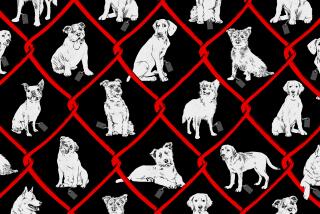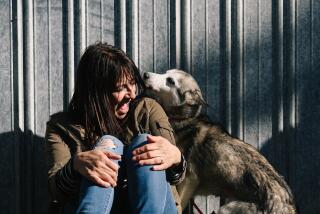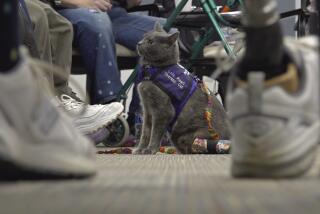Four-Legged Volunteers Spread Love and Laughter in Pediatric Wards : Medicine: The scene is a children’s hospital. Enter a new kind of therapist, and hurt little people begin to laugh--and to get better.
- Share via
NEWINGTON, Conn. — Clover, Tiffany and Sabrina bathe, get their T-shirts on and are driven to the Newington Children’s Hospital, where they will spend the day making the patients laugh.
What makes their charitable visit remarkable is that Clover, Tiffany and Sabrina are Siberian huskies, a new breed of volunteer in a hospital program that is popping up all around the country.
It seems that wagging tails, wet kisses and cold noses have some therapeutic value.
At Newington Children’s Hospital, canine volunteers make the rounds every Wednesday, cheering up little patients as they exude unconditional love.
“It’s a big boost for everyone when the dogs are here,” said Michele Confessore, coordinator of the hospital’s child life program. “The kids love it because it’s almost as though it shouldn’t be happening--that dogs shouldn’t be in a hospital.”
Before a dog can become a Newington volunteer, it must undergo a veterinarian’s thorough examination and be certified healthy. It also must pass behavioral tests to determine how it will react to tail-tugging or having a paw run over by a wheelchair.
The owner brings the dog to the hospital. The dog must be bathed first and wear a specially made T-shirt to contain shedding.
Mary and Bob Gadbois of Old Lyme recently brought Clover, Tiffany and Sabrina and a sled to the hospital. The huskies spent the day pulling the sled up and down the hallways with delighted children on board.
“I’ve been to the hospital lots of times, but never when the dogs were here,” said 11-year-old Erin Corcoran, after commanding the blue-eyed team to “Mush!”
“It’s fun!”
Newington’s Pet Therapy program is the only one in New England that allows dogs to visit hospitalized children, said Elsa Gibbons, director of voluntary services.
The Delta Society, a nonprofit group based in Renton, Wash., conducts studies and teaches people how an animal can affect a patient’s well-being. It counts about 40 similar programs across the country.
Others, such as Pets on Wheels in Baltimore, bring pets to nursing homes, institutions and homes for the retarded or mentally disabled.
“Everyone knows pets are unconditional in their love,” said Elaine Farrant, coordinator of the Baltimore program. “If you don’t look so good or smell so good, the pet doesn’t care.”
At Newington, seven dogs are rotated in the visiting each week. Besides the huskies, they include a golden retriever and an Old English sheep dog. The sheep dog tires easily and puts in less time than the other dog volunteers, Gibbons said.
The Children’s Hospital in Denver started the Prescription Pet Program 15 years ago as one of the first pet therapy programs in the country. In addition to wearing a hospital T-shirt, the Denver dogs also wear hospital identification badges bearing their pictures and paw prints as signatures.
Animal affection has been shown to reduce the stress and anxiety caused by illness and injury, according to the Delta Society. Animals are able to lower blood pressure and provide a means of reaching autistic children, abused adolescents and head-injury patients, the society’s studies have found.
The Newington program began in August, 1989. Gibbons, together with Bill Haines, a veterinarian who is also on the hospital’s board of directors, developed the guidelines based on those followed by the Denver hospital.
The guidelines take into consideration infection control, along with the dog’s temperament and the owner’s.
“The owners have to be prepared for what they might see when they visit the kids,” Confessore explained.
Newington treats children with cerebral palsy, muscular dystrophy and orthopedic disorders. The hospital also has an inpatient psychiatric ward and treats accident victims. Many of the children are in wheelchairs or in traction.
Confessore recalls one profoundly handicapped girl with cerebral palsy who had been almost unresponsive until Savannah, a 120-pound Newfoundland, was brought to visit her.
She described how the child’s first attempts to pet the dog were stiff and awkward, but gradually, she began stroking its black, bear-like coat.
“When someone said ‘it’s time for Savannah to go,’ she put her finger through the dog’s collar,” Confessore recalled. “It was a very emotional time for everyone in the room.”
And the dogs seem to love their visits as much as the children do.
“They can’t wait to get out of the car,” said the huskies’ owner, Mary Gadbois. “They cry and cry because they want to get upstairs and see the kids.”
More to Read
Sign up for Essential California
The most important California stories and recommendations in your inbox every morning.
You may occasionally receive promotional content from the Los Angeles Times.













